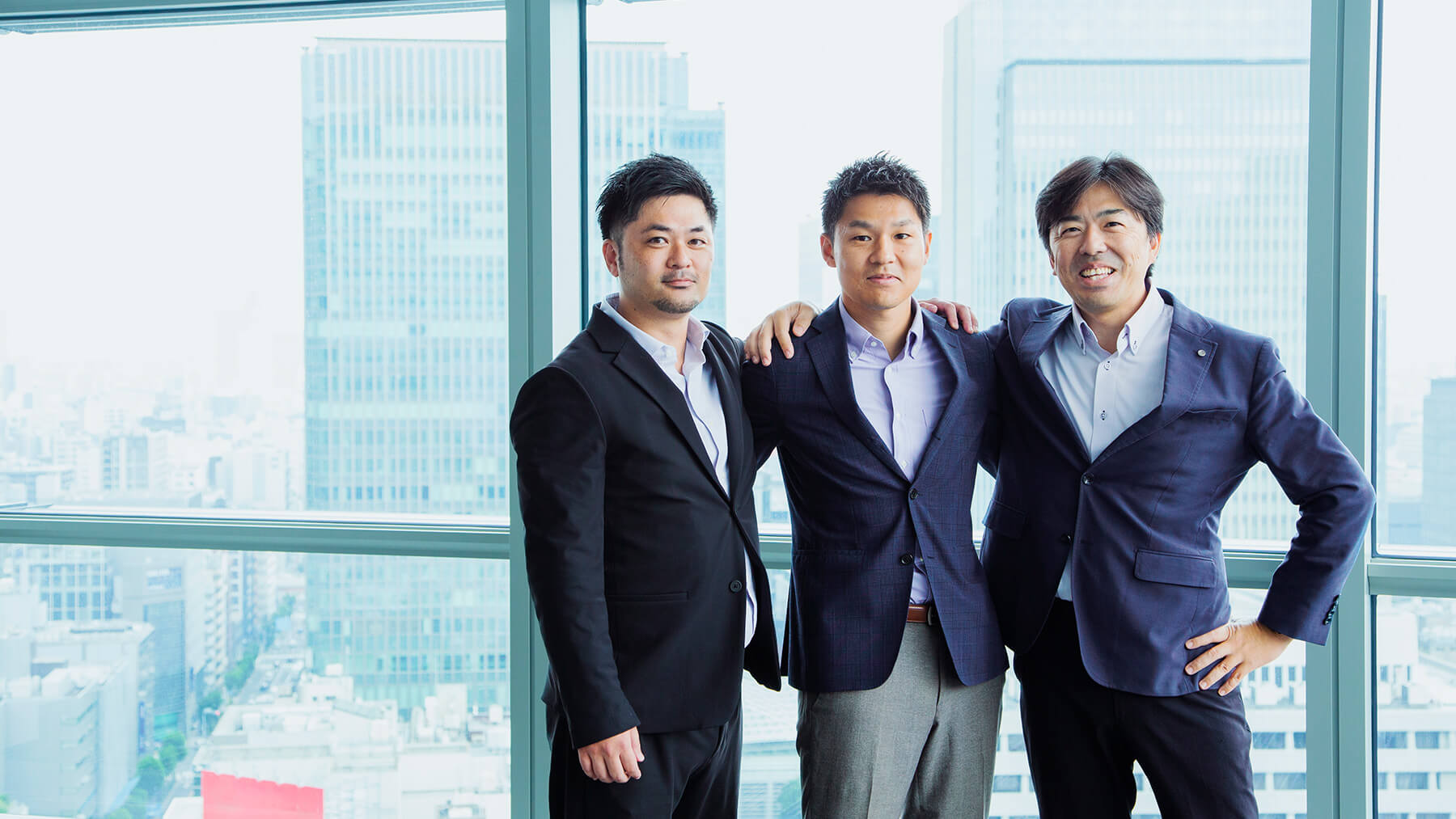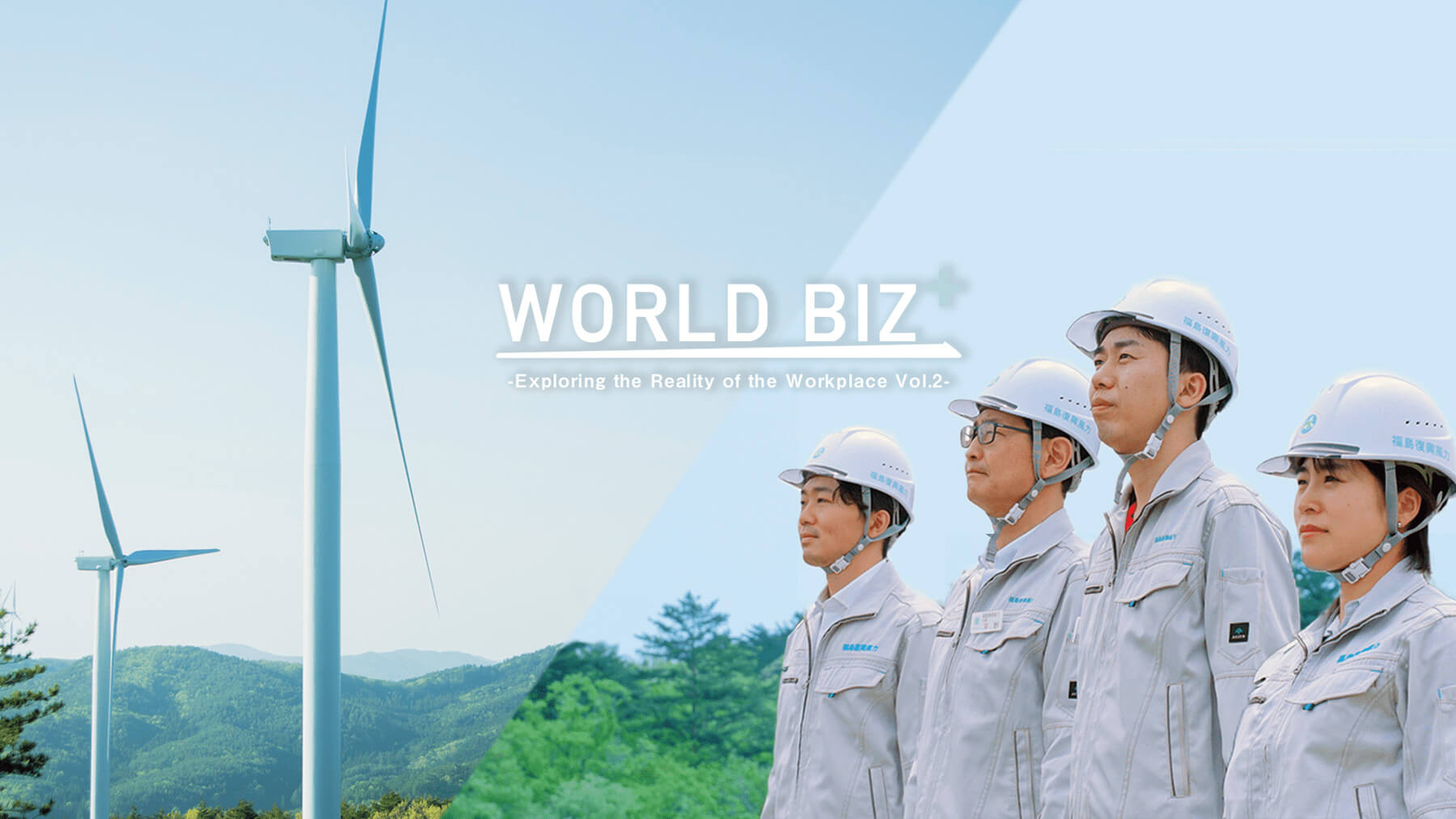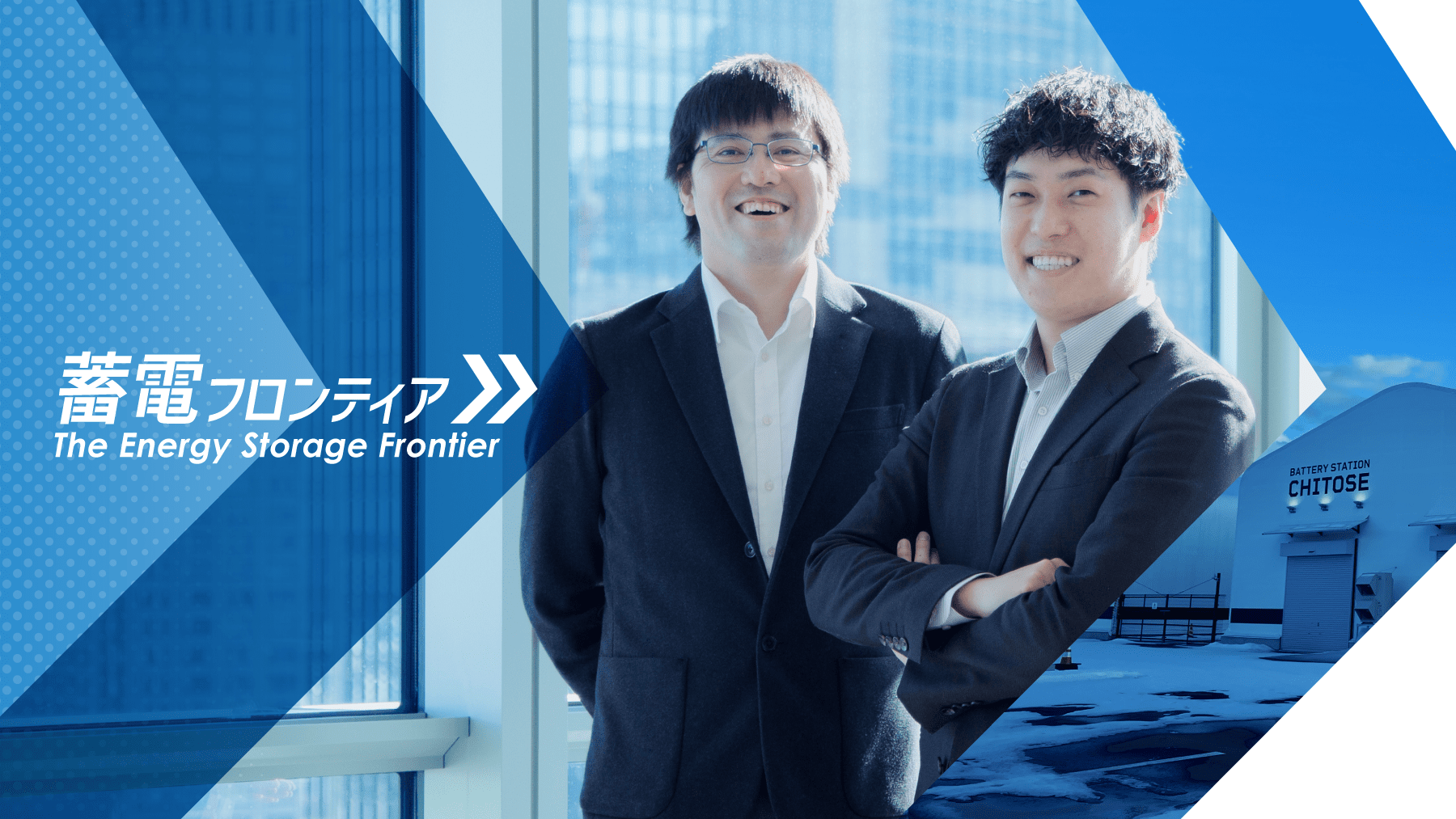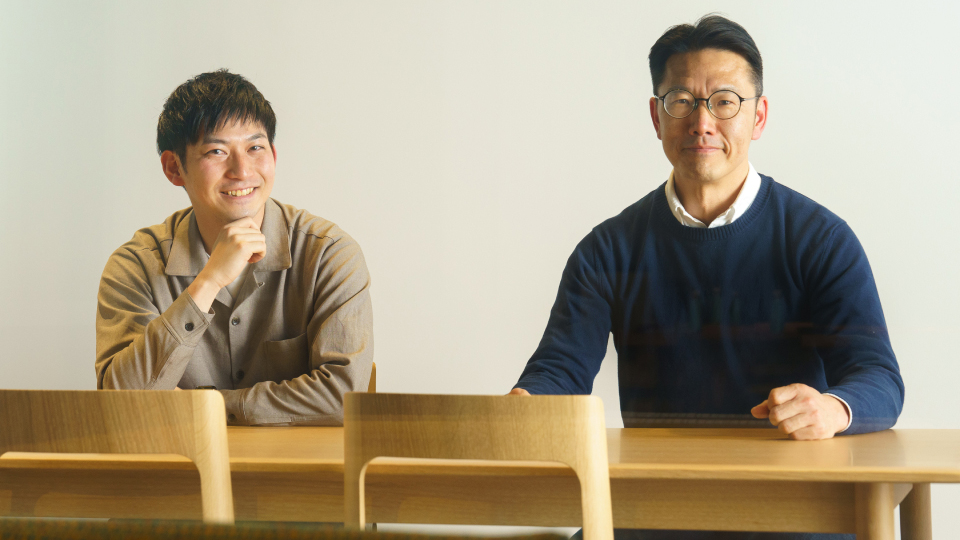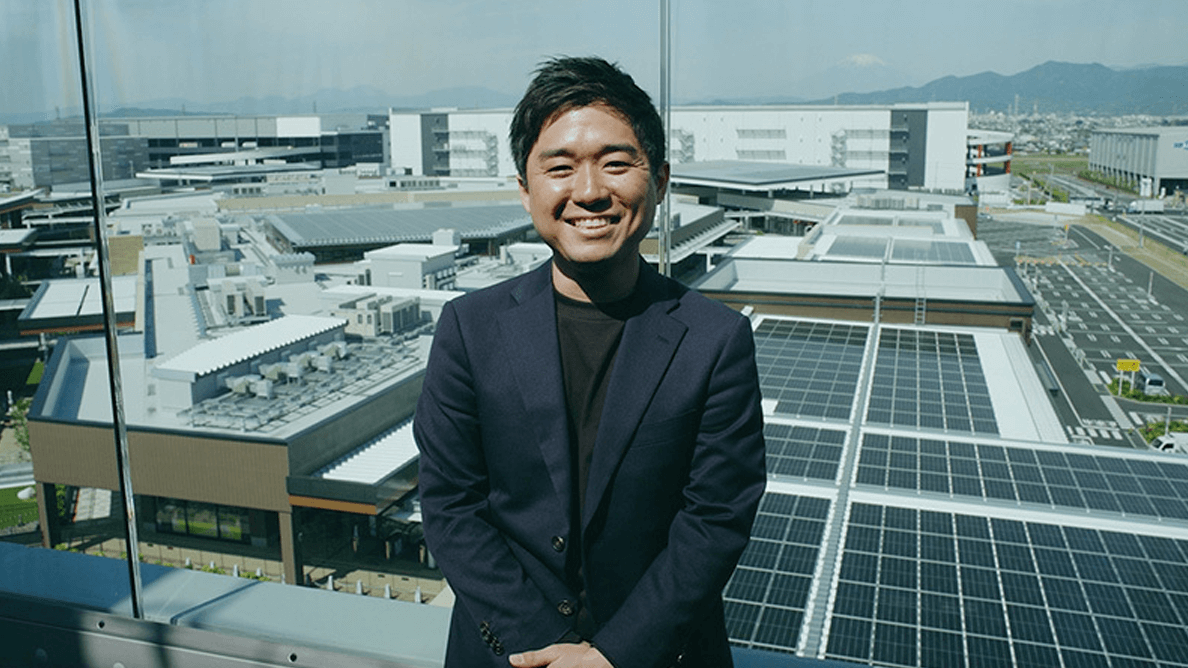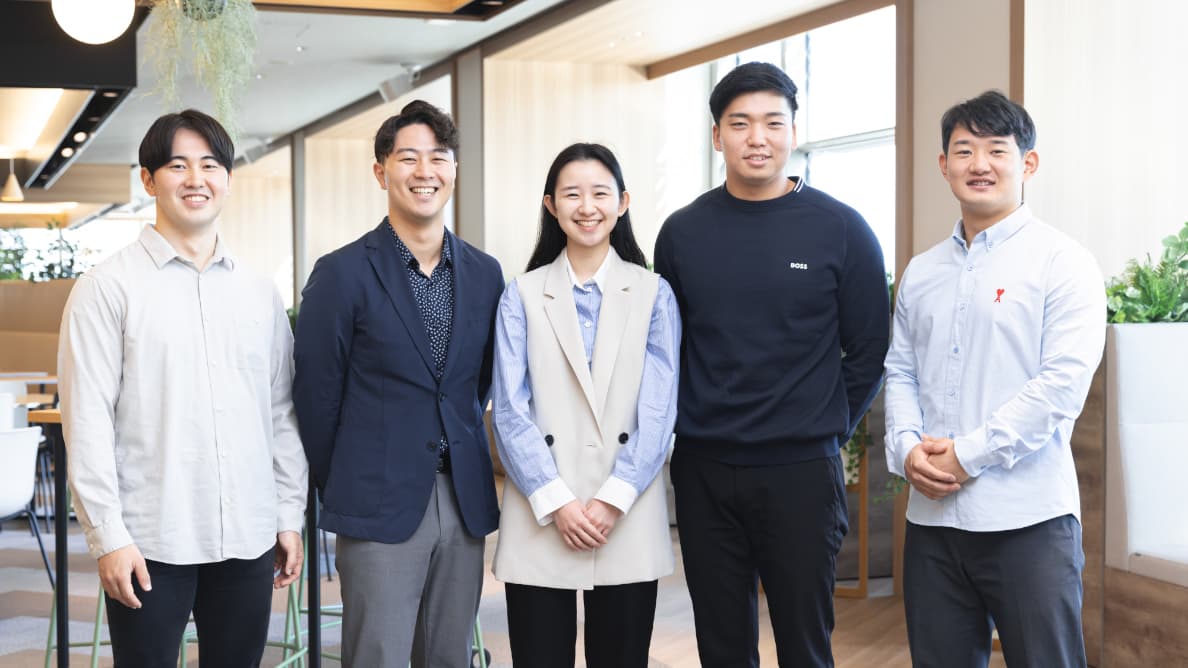
- TOP
- Enriching+TOP
- Spread and Expansion of Renewable Energy through Power Storage Business –Reused EV Battery Project on Koshiki Islands–
2023.10.1
Business
Spread and Expansion of Renewable Energy through Power Storage Business –Reused EV Battery Project on Koshiki Islands–
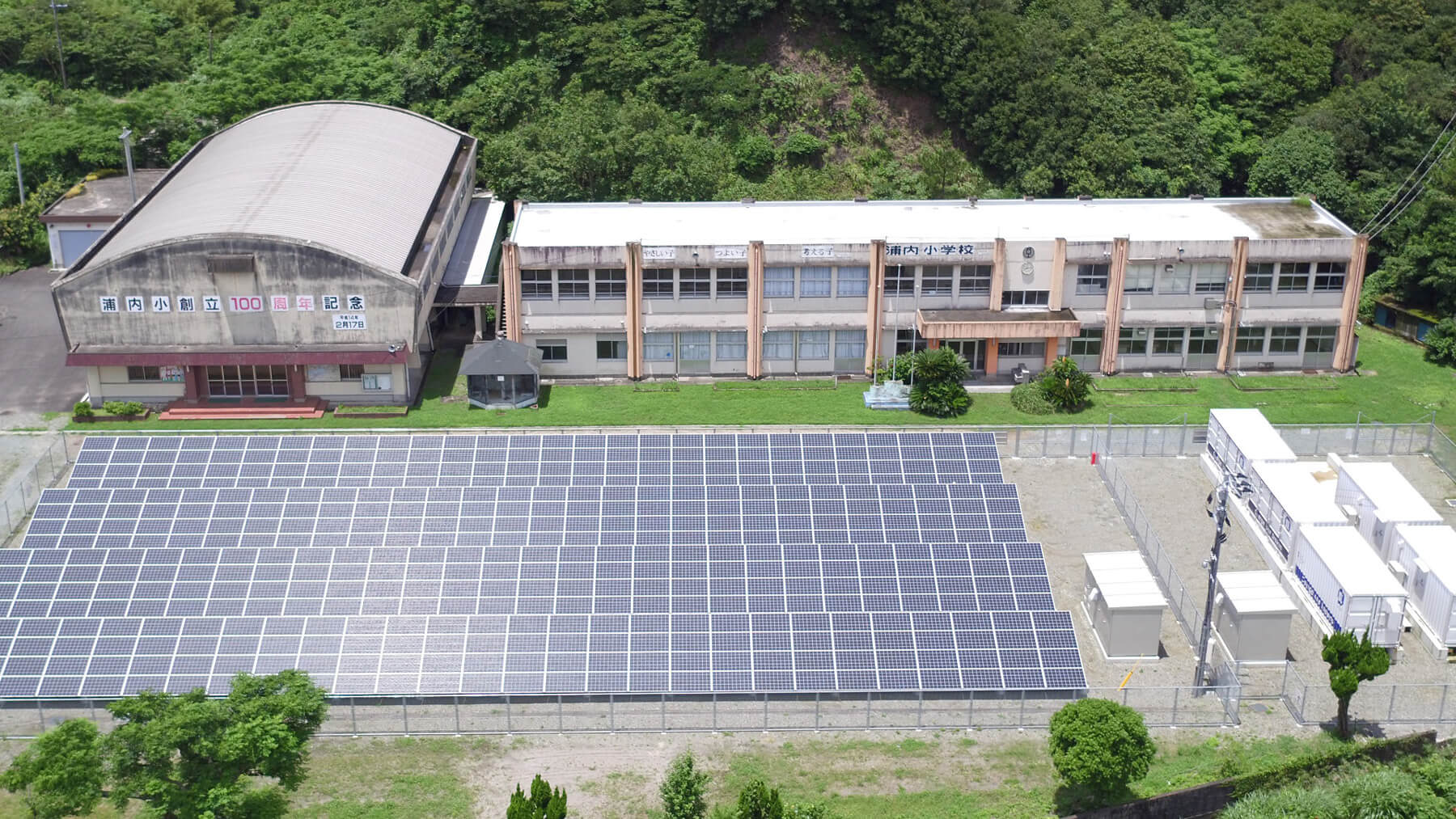
Amid growing concerns about global warming, promoting the spread and expansion of renewable energy is an unavoidable task for us, as humans, if we are to achieve a sustainable low-carbon society. Since the introduction of the Feed-in Tariff (FIT) scheme in July 2012 in Japan, the use of renewable energy has increased rapidly, particularly with the generation of solar photovoltaic power.
However, the volume of power generated by renewable systems fluctuates greatly depending upon conditions in the natural environment such as the amount of sunlight and wind. This means that relying on such power generation systems by connecting them on a massive scale could cause instability to the grid (that is, allowing electric utilities to integrate power generation, transmission and distribution). For this reason, some of the electric utilities that received applications from photovoltaic power generators for permission to connect to their systems, in much larger volumes of renewable power generation than initially envisioned, had to limit the connection capacity and conditions in order to avoid surges from renewable power suppliers and ensure the grid stability. This situation could cause a slowdown in the Japanese renewable energy market.
Against this background, our energy management business, which manages supply to meet demand through the use of large scale power storage systems, is expected to offer critical solutions for spreading and expanding renewable energy.
This content was originally published in August 2015.

- Starting to create a business model for providing an environment in remote islands for introducing and connecting renewable energy by collaborating with local government
- Constructing highly economical power storage systems by effectively utilizing reused EV batteries
- Stabilization of renewables with the power stored in reused batteries in the grid network
- From remote islands to the Japanese mainland and beyond –Contributing to the realization of a sustainable society through the promotion of renewable energy-
- Sumitomo Spirits
- Stakeholder's Voice
Starting to create a business model for providing an environment in remote islands for introducing and connecting renewable energy by collaborating with local government
The fluctuation of renewable energy outputs will affect directly the balance of electric power supply and demand especially on the small-scale grid of remote islands because such islands are isolated from a buffer of the mainland grids. Therefore, introducing renewable energy has been difficult on small, remote islands.
Sumitomo Corporation started to develop a business model for providing an environment for connecting renewable energy by collaborating with the local government of one such grouping of remote islands, the Koshiki Islands in Satsumasendai, Kagoshima. In this project, we are planning to locate a new renewable system and an independent power storage system on the athletic field of the former Urauchi elementary school. The Koshiki-shima Urauchi Solar Farm will have a generation capacity of 100 kW. Meanwhile, the new Koshiki-shima Power Management Center, built from reused batteries taken from electric vehicles (EVs), will have a large-scale storage capacity of 800 kW. We plan to develop our new business model where the battery storage system contributes power supply-demand management for the grid stability.
On the most remote islands currently, electric power relies on diesel generators. The local area is therefore having to cope with the twin issues of large carbon dioxide emissions along with high fuel transportation costs. If we can replace some of these diesel power generators with renewable energy, we can greatly reduce the amount of carbon dioxide emitted on the Koshiki Islands. The realization of this model will also lead to a more stable power infrastructure for these remote islands, which often experience power outages caused by typhoons and other disasters, and this will contribute to the enhancement of disaster countermeasures for the community.
Location of Koshiki Islands, Satsumasendai, Kagoshima
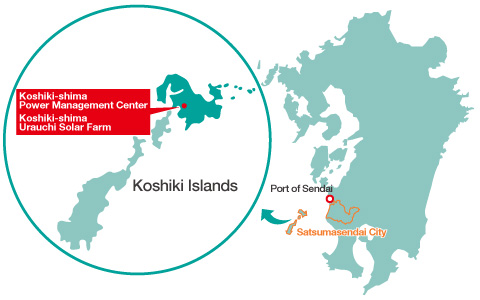
Constructing highly economical power storage systems by effectively utilizing reused EV batteries
In this project we will develop a new energy management model using power storage systems. As our ultimate goal, we are aiming to establish a new business.
One of the crucial points in this project is the utilization of inexpensive used EV batteries. Currently, power storage is still costly, and the high price has been a major hurdle for constructing power storage systems. However, by utilizing used EV batteries that have once completed their service life in vehicles, we can create a second life for them in the power storage systems at an economical cost.
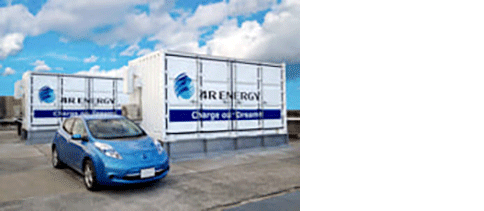
In 2013, Sumitomo Corporation commenced an experimental trial in partnership with 4R Energy Corporation (a joint business with Nissan Motor Co., Ltd.) to verify a large-scale power storage system utilizing reused EV batteries in Yumeshima, Osaka. Technological verification of the system, the first of its kind in the world, was achieved. For the Koshiki Islands we are planning to expand the scale of the design used for this experimental trial and to construct highly economical power storage systems by reusing batteries from 36 Nissan LEAF EVs.
Stabilization of renewables with the power stored in reused batteries in the grid network
In this project we will take on the challenge of connecting power storage systems to the electrical grid independently. Since multiple sites of renewable energy in the region are connected to a single distribution network, more effective adjustment of the renewables' fluctuation at the site of grid network will be achievable compared to placing power storage systems at each individual renewable site. We wish to provide an infrastructure to connect as much renewable energy as possible to the islands by the effective use of the power storage system in the grid network, under technological support from Kyushu Electric Power Co., Inc.
Until now, no independent battery system in the Japanese grid network has been able to provide a stabilization service to renewable power suppliers. In order to successfully transform this project into a new business model, we need to engage in efforts to organize institutional studies to deal with new power-related businesses and to build a scheme for business transactions. By launching this project on the Koshiki Islands and developing the business of energy management using power storage, Sumitomo Corporation hopes to contribute to the spread and expansion of renewable energy as an industry pioneer.
Illustration showing how a power storage system connects to a grid
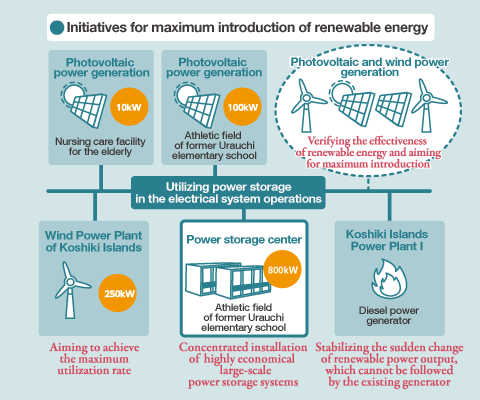
From remote islands to the Japanese mainland and beyond –Contributing to the realization of a sustainable society through the promotion of renewable energy-
As the owner of this project, Sumitomo Corporation pursues the creation of new value in the area of power and energy by bridging two key technologies, EV and renewable energy, to realize a low-carbon society. Using this project as a showcase, we also wish to contribute to the vitalization of the local economy.
Energy management centering on power storage is not only useful for small, remote islands in Japan and overseas, but is also suited to residential areas in the Japanese mainland where the issue of how to expand the installation of renewable energy is being addressed. To achieve this objective, it is important to further develop the business to make it sustainable over the long term by contributing to society and the environment while simultaneously creating a scheme for generating stable revenues.
Using this project as a stepping-stone, Sumitomo Corporation will develop a new energy management business to offer power stabilization and ancillary services using power storage. In the future, we wish to contribute to the realization of a sustainable society through the spread and expansion of renewable energy by deploying this business in various regions, including remote islands of overseas countries, emerging economy countries that are struggling with supply-demand balance adjustment issues, and in the U.S. and Europe, where the liberalization of the power sector is already advanced.
Sumitomo Spirits
-

-
Applying business resources to solve pressing social issues
The current FIT scheme has accelerated investment to renewable energy centering on solar panels, but even if we can generate more environmentally superior renewable energy, we still have to maintain the operation of thermal power plants to override fluctuations and stabilize supply volumes. In order to continue to expand the use of renewable energy, we need to construct a new framework for the overall system, which will include technology, such as batteries, to stabilize the supply.
This reused EV battery project on the Koshiki Islands was commenced as a joint business in partnership with the local government and a private-sector enterprise that share our awareness of the issue. Because this type of project has no precedent in Japan, we often encounter issues in terms of technology and institutional systems. To open up new frontiers, however, we must be willing to take the first step.
To complete the task at hand, it is important to keep in mind our overall aspiration: To contribute to society through the dissemination of renewable energy. The trust we have earned from the other members of this project has been a big help in keeping us oriented and moving steadily toward the goal.
Stakeholder's Voice
New Energy Policy Division, Planning Policy Department, Satsumasendai City, Kagoshima Prefecture
-

-
Sharing a community vitalization model using next-generation energy with the world
In March 2013, Satsumasendai City enacted a Next-Generation Energy Vision and Action Plan and has since been promoting urban development through the utilization of next-generation energy. This project is an important step in this effort. It helps us facilitate the environment for introducing renewable energy on a small-scale on the Koshiki Islands while simultaneously revitalizing the community by generating a new energy service business.
In the future, we will encourage residents of the islands to drive EVs powered with renewable energy and will pursue the development of a low-carbon cycle based on reused EV batteries to further spread the use of renewable energy. Through these efforts we hope to develop the Koshiki Islands into "eco-islands" and leverage the associated brand power to promote tourism.
Because this is a new initiative, there are many hurdles that we need to overcome in terms of technology as well as institutional systems. Therefore, I feel that the key to succeeding in this project is the ability of Sumitomo Corporation personnel to actively visit the local operation sites and the firm's management ability in terms of overcoming issues and dealing with regulations by coordinating with stakeholders.
I wish to continue working toward the realization of this project by closely collaborating with Sumitomo Corporation. I hope that together we can create a model of community revitalization using next-generation energy and spread it at home and abroad under the name "KOSHIKISHIMA."

